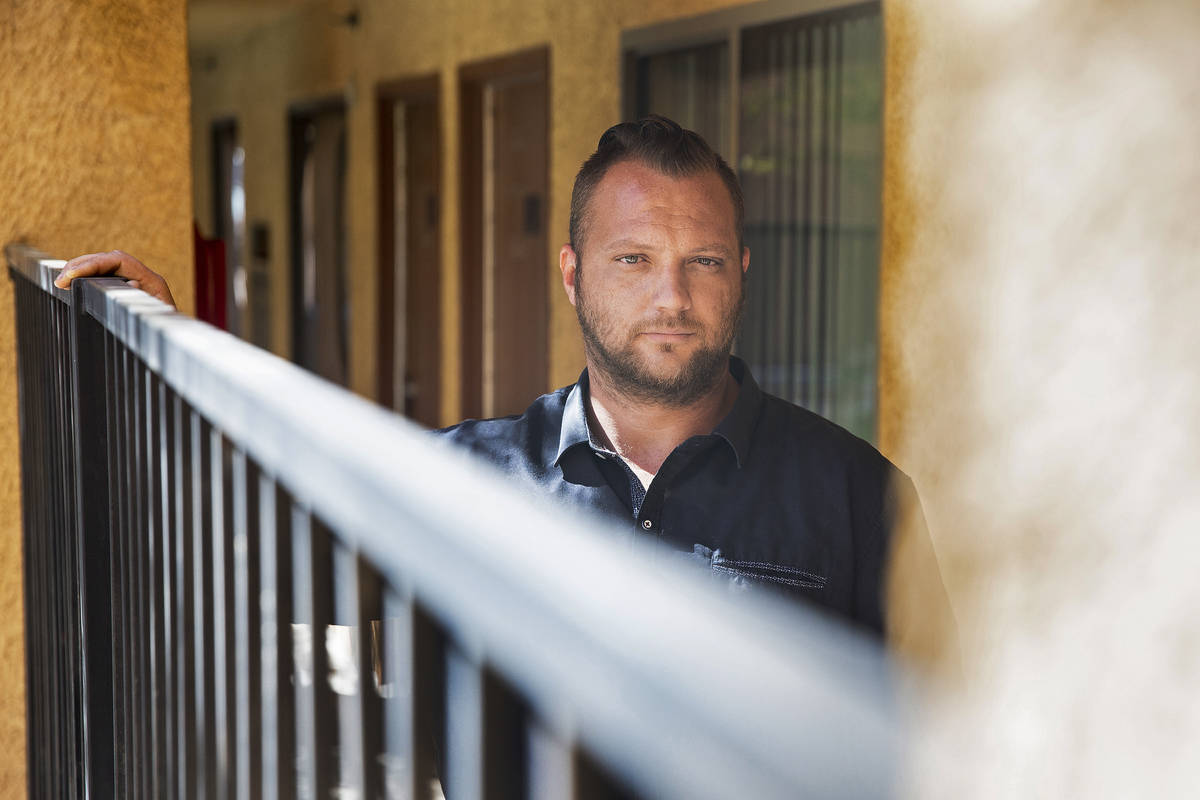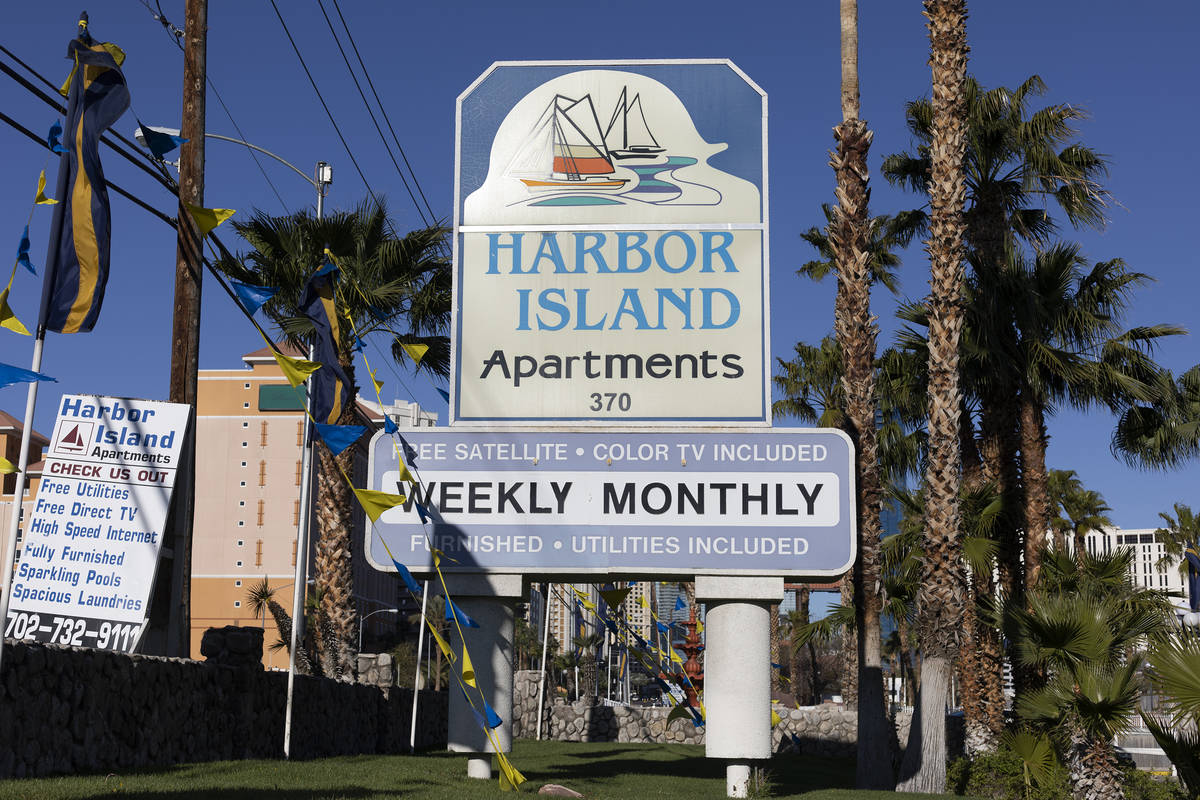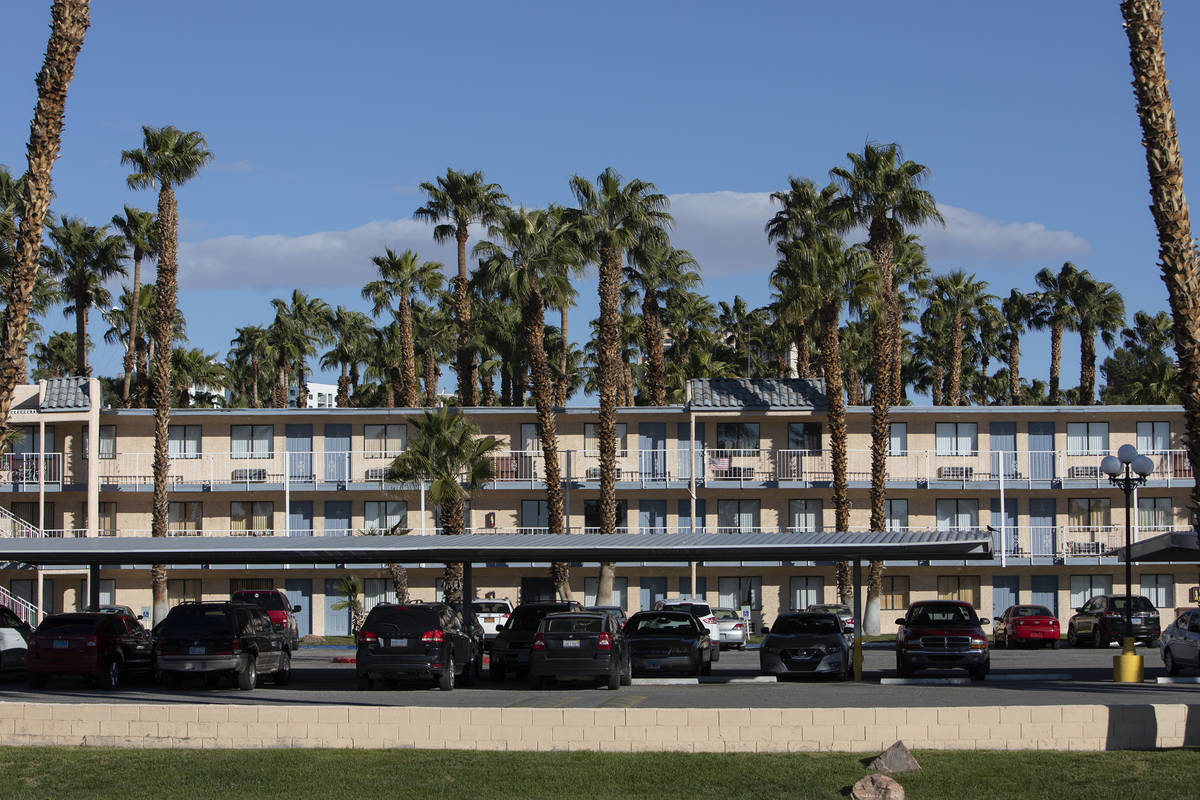Some weekly Las Vegas renters are facing eviction, even with a freeze
Just weeks ago, Charles Moorehead was making decent money as a personal chef for a local family. But when the pandemic prompted social distancing, he was laid off.
Like so many in the Las Vegas Valley, the 32-year-old is now scrounging for work. At home in their apartment at Siegel Suites Tropicana, Moorehead’s wife, 33, is bedridden with stiff-person syndrome, a neurological disorder that causes progressive rigidity throughout the body. Anxiety can trigger spasms so violent that her bones can break. It has no cure.
Her disability benefits help cover her medication. But the ability to cover rent each week is now a guessing game. They’ve already been served a seven-day eviction notice amid a Las Vegas Valley eviction freeze. Management comes to their unit morning and night demanding money.
Moorehead tries to focus on caring for his wife. But each time he ventures outside, he worries that he will return to find her with a punctured lung or internal bleeding, alone at home, triggered by the stress.
“My wife has a suppressed immune system,” he told the Las Vegas Review-Journal. “When I come home, I have to take a shower, change my clothes. I have to wear a mask when I’m with her. I have to feed her and change her diaper.”
He paused for a moment.
“I’m just watching her wither away,” he said. “If I end up with the coronavirus, my wife has nowhere to go. Now these people are coming in and harassing her.”
Frozen — for now
Local evictions are not supposed to be happening right now, regardless of whether people can currently pay rent, though they should if they can, legal advocates say. Court orders prevent evictions until at least mid-April.
But amid the pandemic, weekly renters like Moorehead are still quietly being served eviction notices and in some cases being kicked out of complexes, the Las Vegas Review-Journal has learned. Throughout Clark County, a mix of properties advertise more than 8,000 rooms as rent-by-the-week, records show.
Sisolak says relief for Nevada homeowners, renters in the works
Evictions are handled through the court system. Right now, even if they are served a notice, most tenants currently have no deadline to respond, since local eviction cases are not supposed to move forward until the freeze is lifted.
But what happens when that freeze ends is currently unknown. Will the seven-day countdown that Moorehead was issued start immediately? Or will landlords and property managers have to issue a new notice? Legal advocates aren’t sure.
“Landlords are being predatory and taking advantage of that confusion,” said Lauren Peña, directing attorney at the Civil Law Self Help Center. “It’s deceptive and attempting to deceive people into picking up and moving.”
Some weekly complexes, many of which use digital key cards for apartment access, are also apparently revoking or threatening to revoke access for people who cannot come up with rent, avoiding the courts altogether. It’s a practice that in some cases skirts the law, according to Peña.
“We have seen quite a few inquiries on this in the last few days,” Peña said.
Tenant protections
State law provides tenant protections to renters living in hotels or motels, including weeklies, as long as they have been a tenant for at least 30 days. That means your landlord or property manager cannot lock you out or evict you without court action.
Moorehead has lived at the complex for several months in a unit owned by a friend. The moratorium gives him some time, and as of Friday he had not been threatened with a lockout. But because management still issued him an eviction notice, he remains in limbo until the freeze is lifted.
A property manager at Moorehead’s complex did not return a request for comment.
Still, one man told the Review-Journal that the complex where he has lived for more than a year, Emerald Suites off Las Vegas Boulevard South, recently informed him that his digital key card would simply expire if he could not make rent.
The man declined to use his name. He works as a Lyft driver, but with advisories to stay home and little to no tourists, business has plummeted.
“If I’m suffering, people with children, people with multiple households living together are suffering,” the man said Monday.
A woman working at the property’s front desk told the Review-Journal that she was not personally aware of anyone being locked out. Shortly after the phone call, the man said an employee had come to his unit and said they would work with him.
“The situation is new to everybody, and I can assure you that across the board, through all our communities, we are working with residents,” said Julia Furrule, director of operations of Advanced Management Group, which manages the property.
Furrule was not aware of the man’s claims, which he now considers resolved. She said Advanced Management Group has not served official eviction notices at any of its properties in almost two weeks.
If you can establish that you are a tenant who has rented at a weekly for longer than 30 days, Peña said it’s best to still try to pay your rent, but if you are having difficulty, let your landlord know that there’s a suspension on evictions.
If your landlord does not understand or listen and proceeds to lock you out, you can file an illegal lockout complaint with the court, which are still being accepted and heard amid the eviction freeze.
An illegal lockout complaint must be filed within five days of your lockout. You would be entitled to a hearing, likely over the phone at this point, within three days, Peña said.
As a result, the landlord or property manager could be subject to a fine and ordered to let you back in.
For more guidance, call the Legal Aid Center of Southern Nevada at 702-386-1070. You can also call Nevada Legal Services at 702-383-6095.
More options
If you have rented at a weekly for less than 30 days, you can be locked out for not paying rent without court involvement.
But there is still an argument for protection during the eviction freeze, advocates say. It’s called a “manifestation of intent,” a way to show that you intended to continuously live at your rental for longer than 30 days.
Examples include establishing an internet or cable service at your unit or enrolling your children in a nearby school, Peña said.
“It’s not about what’s in your heart. It’s about how you can show or prove that,” Peña said, pointing to the example of someone buying a picture frame for the apartment. “Anything you did that was more than just bringing a suitcase.”
Another example: having mail sent to your new complex, according to Dawn Jensen, an attorney who supervises the Tenants’ Rights Center at Nevada Legal Services.
There is also an argument to be made for protection through the simple act of paying rent weekly, even if it’s been less than 30 days, Jensen said.
“That says to me, if you’re a weekly payer, ‘You know I’m not a hotel guest; you know I’m a tenant,” Jensen said.
If you believe you may qualify and have been locked out of your unit, you too can file an illegal lockout complaint so your argument can be heard, Jensen said. Again, it would need to be filed within five days of the lockout, and you would be heard within three days.
Still stressed
That guidance was encouraging to Joeigh Cannick. But it did little to ease her anxiety.
As of Wednesday, she had lived at Harbor Island Apartments for about two weeks, where she pays rent weekly. She had previously lived at another weekly complex for about six months, but when the call center where she worked changed locations, she opted to move closer to her job.
Before she moved, Cannick, 40, did not realize that she would lose the guaranteed tenant protections that she had established at her last complex. Her steady 39 hours of work suddenly became zero, and with no way to pay rent, she was told her key card would expire.
As the days ticked down, she spent her free time submitting applications for nearby jobs. If it came to it, waiting for an illegal lockout hearing could still mean days of homelessness, she worried.
“I have nowhere to go,” she told the Review-Journal at the time. “It’s just me. I pay my own bills. I take care of myself. It’s just me.”
Furrule, of Advanced Management Group, which also manages the complex where Cannick lives, said that regardless of the 30-day threshold, the company would still work with residents. She encouraged Cannick to contact corporate.
When Cannick did, 60 days were added to her key card, she told the Review-Journal. Front desk workers seemed annoyed that Cannick had gone over their heads, she said, but she was thankful.
“I couldn’t even sleep at night from worrying about getting put out of my place,” she said.
Though it is a legal gray area at a financially difficult time, Jensen argued that weekly landlords and property managers should consider not locking out residents when they have nowhere to go.
“A lot of people don’t have money right now because they got laid off and they are trying to save,” Jensen said. “Maybe if they feel like they have a place to stay, they can better evaluate their finances.”
Meanwhile, Moorehead is counting down the days until the eviction freeze is lifted, contacting legal advocates and private attorneys for guidance on what to do once the ball drops. His complex continues to tack on late fee after late fee.
At home, he stresses silently. He picked up a few hours of auto work recently. He tries to comfort his wife.
Correction: A earlier version of the story incorrectly stated Charles Moorehead has lived at Siegel Suites for more than a year. Moorehead has lived there for several months.
Contact Rachel Crosby at rcrosby@reviewjournal.com or 702-477-3801. Follow @rachelacrosby on Twitter.



















































